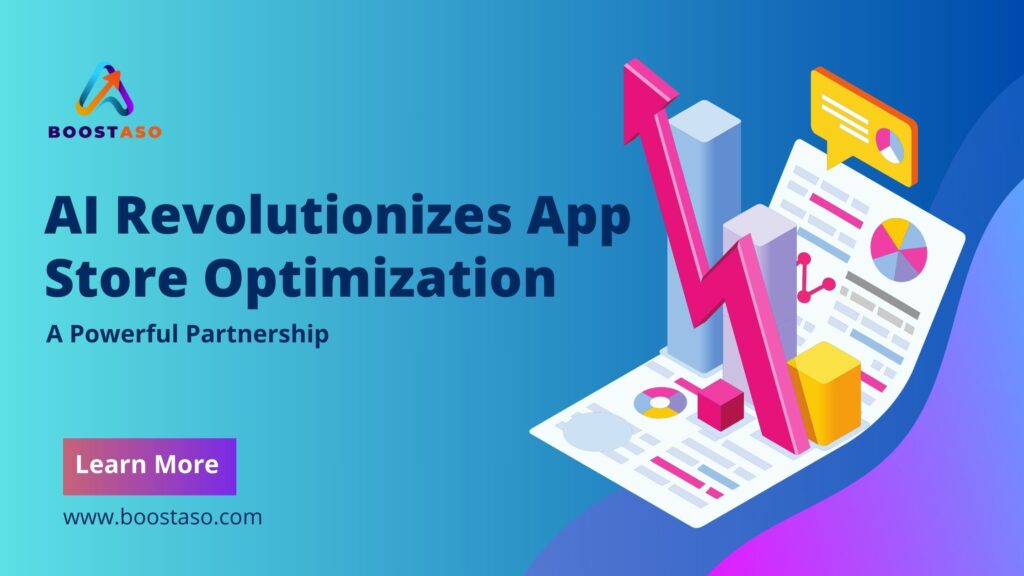
The app market is fiercely competitive, and discoverability is crucial for success. Thankfully, AI is transforming ASO, offering developers and marketers a powerful toolkit to enhance app visibility and user engagement. This blog explores how AI is redefining ASO practices, from keyword research to understanding user behaviour. We’ll also address the limitations of AI and how it can best be used alongside human expertise.
AI’s Role in ASO
AI empowers ASO by automating tasks and extracting valuable insights from vast amounts of data. Here’s how:
- Data-Driven Decisions: AI goes beyond simply providing raw data. It analyzes app store performance metrics, user engagement patterns, and competitor trends to provide actionable insights. This allows developers to pinpoint areas for improvement in user acquisition, retention, and monetization. For instance, AI can reveal which marketing channels are driving the most high-value users, identify features with low engagement, and uncover opportunities to optimize pricing strategies. By surfacing these insights, AI empowers data-driven decision making throughout the entire app lifecycle.
- Keyword Optimization: AI goes beyond basic keyword research tools by offering a comprehensive approach to keyword strategy. It can identify high-value keywords with strong search volume and relevance to your app, but that’s just the beginning. AI can also uncover:
- Long-tail keywords: These are more specific keyword phrases with lower search volume but higher conversion rates, as users are further along in the buying journey. AI can help you identify long-tail keywords that are relevant to your app and have less competition, allowing you to target users with a strong intent to download.
- Seasonal trends: User search behavior can fluctuate throughout the year. AI can analyze historical search data to identify seasonal trends and suggest relevant keywords to target during specific times of the year. For example, an app that helps people make travel plans might see a surge in searches for keywords related to “summer vacation” in the months leading up to summer.
- Emerging trends: AI can stay ahead of the curve by analyzing search queries and social media conversations to identify emerging trends that are relevant to your app. By incorporating these trending keywords into your app’s metadata, you can ensure your app is discoverable by users searching for the latest and greatest apps.
- Metadata Optimization: AI-powered tools can analyze the effectiveness of various aspects of your app’s metadata, including app titles, descriptions, and visuals. By comparing your app’s metadata to top-performing competitors in similar categories, AI can identify areas for improvement. For instance, AI can help you determine if your app title is concise, informative, and includes relevant keywords. It can also analyze the length and content of your app description to ensure it effectively communicates the value proposition of your app and entices users to download. Additionally, AI can analyze the visuals used in your app store listing, such as screenshots and app icons, to identify what resonates with users. By providing data-driven insights on all these aspects of your app’s metadata, AI empowers you to create a compelling app store listing that increases visibility and conversion rates.
Here are some key ways you can use AI to get data-driven marketing insights in ASO:
- Performance Analysis: AI excels at identifying app performance metrics, from download figures and user retention rates to ratings and review sentiments. This analysis sheds light on an app’s strengths and weaknesses, guiding developers on where improvements are needed.
- User Engagement Insights: By evaluating how users interact with apps, AI identifies patterns that contribute to higher engagement levels. This can inform the design of features, tutorials, and in-app experiences that keep users coming back for more.
- Metadata Optimization: AI-powered tools analyze the effectiveness of app titles, descriptions, keywords, and visuals, comparing them against top-performing apps in similar categories. This data helps developers craft compelling metadata that resonates with users and improves app store ranking.
- Competitive Analysis: AI algorithms can monitor competitors’ performance, offering a clear perspective on market dynamics. Understanding what makes competing apps successful helps you craft strategies that capitalize on market gaps or leverage emerging trends.
Practical Applications of AI in ASO
- Optimizing Text Metadata: AI tackles the challenge of adapting to evolving user interests and identifying emerging trends. AI-powered tools like AppTweak’s Atlas AI go beyond keyword research, suggesting future-proof keywords that ensure long-term discoverability. Remember, human expertise is still crucial to craft engaging and informative app descriptions.
- AI-powered App Localization: AI streamlines app translation and tailors content for cultural nuances. Tools like Google Translate leverage machine learning for contextually accurate translations, ensuring global audiences have a great user experience. However, human translators remain essential for cultural sensitivity and avoiding misinterpretations.
- Refining App Store Creatives: AI analyzes millions of images and videos to identify trends in visuals that resonate with users. This data-driven approach helps create app icons, screenshots, and video previews that are more likely to attract and convert users. AI tools like Midjourney simplify app icon creation based on specific prompts. Additionally, AI can automate A/B testing of creatives, as PressPlay does for game developers, significantly reducing time and effort while optimizing conversion rates.
Understanding the Limitations of AI
While AI excels at data analysis and automation, it has limitations, particularly in capturing the emotional depth and cultural nuances that human creativity brings. AI-generated content can lack the human touch that truly connects with users. The ideal approach is to leverage AI for brainstorming and initial ideas, followed by human refinement to ensure content resonates on a deeper level.
- Extracting Value from User Reviews with AI
AI can analyze user reviews to uncover valuable insights. It can identify key topics and track their evolution over time, helping developers understand user pain points and preferences. Sentiment analysis, powered by AI, categorizes user feedback as positive, neutral, or negative, providing a comprehensive overview of user satisfaction and areas for improvement. This empowers developers to adapt product development and marketing strategies accordingly.
- The Future of AI in ASO: A Collaborative Approach
The future of ASO lies in a powerful partnership between AI and human expertise. AI provides the data and automation, while human creativity ensures content resonates with users. By combining these forces, developers can create a truly user-centric ASO strategy that drives discovery, engagement, and ultimately, app success.
AI Tools used for ASO
- Decode the App World with Data AI
Want to win in the booming app business? Data AI is your secret weapon! Trusted by over 1 million users, it’s the go-to platform for app market analysis.
Uncover hidden gems:
- See which apps are dominating the market, category by category and country by country.
- Track downloads, revenue, usage, and how users engage – all in one place.
Grow your app like a pro:
- ConnectPlus (Free!): Monitor your app’s performance – downloads, usage, and even revenue – for free! See how you’re stacking up against the competition.
- Data AI Ascend: Master your advertising strategy. Get a unified view of your ad spend and user acquisition to maximize your return on investment.
Stop guessing, start winning with Data AI!
2. ChatGPT- OpenAI
Imagine a super-powered brainstorming buddy for your app! That’s ChatGPT for app creators. It’s a clever AI tool that helps you with:
- Keyword magic: Are you stuck finding the right words to get your app discovered? Just tell ChatGPT a bit about your app, and it will spit out a bunch of keywords people are searching for.
- App Store Shine: Crafting catchy titles, descriptions, and subtitles for app stores can be tough. ChatGPT can help by whipping up creative ideas highlighting your app’s best features.
- Simple and clear: No tech jargon here! ChatGPT uses plain language so it’s easy to understand and use.
3. SplitMetrics
SplitMetrics Acquire uses AI to help Apple Search Ads advertisers by giving smart tips on keywords and bids. Its AI tools offer deep competitive research and valuable insights.
AI algorithms in SplitMetrics Acquire also evaluate how well ad campaigns are doing across different channels, which is great for multi-channel advertising strategies.
Unity’s Luna is another AI tool that optimizes ads on over 30 channels. It uses machine learning to analyze a lot of data about user behavior, bids, and keywords. This info is shown on an easy-to-use dashboard, offering helpful insights and suggestions.
4. Synthesia
Synthesia is the top AI Video Creation Platform. With our AI Video Generator, anyone can make professional videos without needing mics, cameras, actors, or studios. Our AI technology is transforming video content creation, making it easy, affordable, and high-quality.

